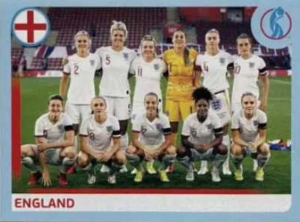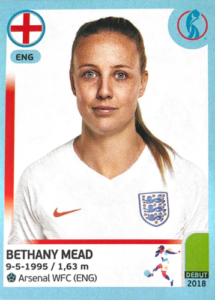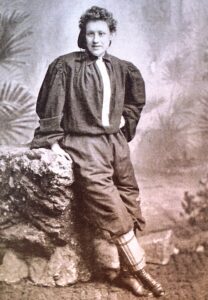Book Review: You Have the Power: Find Your Strength and Believe You Can by Leah Williamson & Suzanne Wrack
 If ever there was an inspirational role model for the current generation of children, Euros winning captain and Arsenal stalwart Leah Williamson fits the bill and then some. So the publication of her first book, You Have The Power, written with the recent Sports Book Award-winning Suzanne Wrack – an inspiration in her own field – is both fitting and vital.
If ever there was an inspirational role model for the current generation of children, Euros winning captain and Arsenal stalwart Leah Williamson fits the bill and then some. So the publication of her first book, You Have The Power, written with the recent Sports Book Award-winning Suzanne Wrack – an inspiration in her own field – is both fitting and vital.
On the pitch, Williamson has made a name for herself for being an exceptional footballer, a positive teammate and a calm leader, while off it, she is an articulate, thoughtful and empowering role model, and the defender brings all of this to a book which serves as a positive guide for children. Drawing on her own experiences, skills and learnings, Williamson offers valuable guidance, advice and inspiration to a generation – especially a generation of girls – that arguably has both greater opportunities but also greater, albeit different, challenges than generations before.
Williamson opens up on some of her own difficulties and issues, including her struggles being able to walk properly when younger, and her debilitating nerves that left her hating every second of the FA Cup Final she played against Chelsea in 2018. Indeed, the extent of her anxiety around the game is really (excuse the pun!) eye-opening, as she admits that it got so bad that it affected her vision. While Williamson has worked to overcome the issue, it is a powerful acknowledgement of the effect and challenge of anxiety in professional sport and the pressures at the top of the game, but also in life and sport in general, that will resonate with everyone who’s ever taken part in any kind of competition, be it a school sports day, a grassroots match, a swimming gala or a cup final. Crucially, Williamson helps to normalise the experience and demonstrate a way forward that many will find reassuring.
Her experience as a girl playing in a boys’ football team is also a powerful narrative, both a sad reminder of the state of play for many girls in the recent past and even the present for whom girls’ teams aren’t readily available and an inspiration for those girls. It’s just a shame that previous generations didn’t have this book to validate their own experiences in the same way. Similarly emotive are Williamson’s pertinent reflections on girls’ often uneasy relationship to physical education at school, as well as body confidence and puberty – topics that are often ignored but are hugely relevant and important in helping make sport an appealing and safe space for young women. And I love Williamson’s passion for the importance of exercise, encouraging readers to engage with sport of any kind. It’s a sad truth that a lot of girls still miss out, or give up, on sport because of physical, mental, social barriers and the like, so to have someone like Williamson encourage, advocate and demonstrate the benefits of an active life is really inspiring.
There is a similarity in style and tone to the advice books by Marcus Rashford (You Are A Champion/You Can Do It) but having Leah Williamson on the front of this book will certainly help reach a different audience, although both authors have ensured their books are utterly inclusive. As with Rashford’s books, there are key maxims and life lessons emphasised throughout, and I loved the fact that rather than just empty sayings Williamson expands on these messages so that when she talks, for instance, about not comparing yourself to others, she helpfully explains about individuals’ different developmental timelines, which gives the messaging greater clout. It is brilliant that this generation can learn from this wisdom – how I only wish I’d had access to such a book when I was younger, and many others will do too. Again, it serves to show just how important the Lionesses and their success last summer has been, and can continue to be, not just on a sporting platform, but a social and cultural platform, which is an even greater success.
One of the unfortunate happenstances of this book is that Williamson reflects on the ACL injuries of fellow players, only to have gone on since publication to suffer that season-changing injury herself, which will sadly rule her out of this summer’s World Cup. Having suffered a number of previous ankle injuries, as she explains in the book, here’s to Williamson, a genuine role model for this generation’s youngsters, once more coming back even stronger.
Jade Craddock
(Publisher: Macmillan Children’s Books; Main Market edition. March 2023. Paperback: 144 pages)
Buy the book here: You Have the Power
 The Lionesses’ monumental crowning as European champions last summer has done much to change the whole landscape of football, not only on the pitch, but off it too. And one of the success stories emerging from their victory looks to be in the world of publishing. Historically, there has been something of a dearth of books about women’s football, despite there being a wealth of narratives out there. But, already, since last summer, there have been, amongst others, excellent autobiographies published by Alex Scott and Millie Farrow, children’s non-fiction from Leah Williamson and Beth Mead, and forthcoming non-fiction from Jane Purdon and Carrie Dunn. Amongst this groundswell of publishing passion, Abdullah Abdullah has offered a fitting contribution: Lionesses: Gamechangers.
The Lionesses’ monumental crowning as European champions last summer has done much to change the whole landscape of football, not only on the pitch, but off it too. And one of the success stories emerging from their victory looks to be in the world of publishing. Historically, there has been something of a dearth of books about women’s football, despite there being a wealth of narratives out there. But, already, since last summer, there have been, amongst others, excellent autobiographies published by Alex Scott and Millie Farrow, children’s non-fiction from Leah Williamson and Beth Mead, and forthcoming non-fiction from Jane Purdon and Carrie Dunn. Amongst this groundswell of publishing passion, Abdullah Abdullah has offered a fitting contribution: Lionesses: Gamechangers. Goals galore – There’s surely only one place to start when looking back on the game and that’s the record-breaking goal haul. In truth, there had been little in the much cagier first-round match against Austria to suggest an eight-goal drubbing was on the cards. The Lionesses had been efficient if not eye-catching in that 1-0 opener and talk had been of being more clinical, more ruthless, taking the chances when they came. And, boy, did England deliver. Penalties, tap-ins, mazy runs, headers, we were treated to a goalscoring extravaganza, which lacked only an acrobatic overhead kick to place the cherry on the proverbial cake. Despite England’s clinical display, in all honesty there were chances to hit double figures, which would have done very little for Norway’s morale but would have sent a home nation already basking in the heat into meltdown. But let’s not get greedy, eight goals will do nicely, for starters. Let’s save the 10-0 victory for the Final.
Goals galore – There’s surely only one place to start when looking back on the game and that’s the record-breaking goal haul. In truth, there had been little in the much cagier first-round match against Austria to suggest an eight-goal drubbing was on the cards. The Lionesses had been efficient if not eye-catching in that 1-0 opener and talk had been of being more clinical, more ruthless, taking the chances when they came. And, boy, did England deliver. Penalties, tap-ins, mazy runs, headers, we were treated to a goalscoring extravaganza, which lacked only an acrobatic overhead kick to place the cherry on the proverbial cake. Despite England’s clinical display, in all honesty there were chances to hit double figures, which would have done very little for Norway’s morale but would have sent a home nation already basking in the heat into meltdown. But let’s not get greedy, eight goals will do nicely, for starters. Let’s save the 10-0 victory for the Final. Near-perfection – It’s something we all strive for, the achievement of perfection in whatever context we apply it, but in reality it happens very rarely, if ever. Monday night’s, however, must be as close as it comes to a perfect Lionesses performance, a perfect football performance. The eight goals, of course, tell their own story, but in terms of a complete team performance, there was very little more that Sarina Wigeman could have asked for or the players delivered. Offensively, it was about as good as it gets, with wave after wave of searching attacks, led most notably by both wide players, as well as England’s advanced full-backs. And whilst a clean sheet may be the least of Monday night’s headlines, how much more satisfying does 8-0 sound than 8-1 or 8-2? Critics will be quick to argue that the defence had an easy night of it, with very little in the way of a threat from Norway, but one lapse in concentration, one missed header on a corner or one moment of indecision at the back and a chance could have been capitalised on, but once again Millie Bright was at the heart of deflecting any Norwegian half-chances and securing a confidence-boosting second clean sheet of the campaign.
Near-perfection – It’s something we all strive for, the achievement of perfection in whatever context we apply it, but in reality it happens very rarely, if ever. Monday night’s, however, must be as close as it comes to a perfect Lionesses performance, a perfect football performance. The eight goals, of course, tell their own story, but in terms of a complete team performance, there was very little more that Sarina Wigeman could have asked for or the players delivered. Offensively, it was about as good as it gets, with wave after wave of searching attacks, led most notably by both wide players, as well as England’s advanced full-backs. And whilst a clean sheet may be the least of Monday night’s headlines, how much more satisfying does 8-0 sound than 8-1 or 8-2? Critics will be quick to argue that the defence had an easy night of it, with very little in the way of a threat from Norway, but one lapse in concentration, one missed header on a corner or one moment of indecision at the back and a chance could have been capitalised on, but once again Millie Bright was at the heart of deflecting any Norwegian half-chances and securing a confidence-boosting second clean sheet of the campaign. Star player – It’s hard to look past hat-trick hero Beth Mead when picking the standout performer from Monday night and in truth all sixteen players who featured would feel hard done by to pick up less than an 8/10 in any ratings. Anyone who watched Tuesday morning’s Euros summary on Sky Sports News would have seen broadcaster Emily Dean dishing out ratings of 60, 70 and 74 – out of 10 – to England’s Lionesses and it’s hard to argue. But whilst Mead rightly deserves another raft of plaudits, Ellen White proved just why she has been England’s number 9 for over a decade. Indeed, it was one of the best number 9 performances I’ve seen in the game in a long while – a complete masterclass in the position. It was as if she was in an instructional video demonstrating how to play the role, with work rate, hold-up play and hassling of defenders all covered, whilst her first goal illustrated tenacity, strength and composure and her second goal movement, positioning and the predatory qualities of all great forwards. White hasn’t always got the recognition she deserves despite being England women’s record goalscorer, but for any doubters, Monday night was a demonstration of just what a complete striker the Man City player is.
Star player – It’s hard to look past hat-trick hero Beth Mead when picking the standout performer from Monday night and in truth all sixteen players who featured would feel hard done by to pick up less than an 8/10 in any ratings. Anyone who watched Tuesday morning’s Euros summary on Sky Sports News would have seen broadcaster Emily Dean dishing out ratings of 60, 70 and 74 – out of 10 – to England’s Lionesses and it’s hard to argue. But whilst Mead rightly deserves another raft of plaudits, Ellen White proved just why she has been England’s number 9 for over a decade. Indeed, it was one of the best number 9 performances I’ve seen in the game in a long while – a complete masterclass in the position. It was as if she was in an instructional video demonstrating how to play the role, with work rate, hold-up play and hassling of defenders all covered, whilst her first goal illustrated tenacity, strength and composure and her second goal movement, positioning and the predatory qualities of all great forwards. White hasn’t always got the recognition she deserves despite being England women’s record goalscorer, but for any doubters, Monday night was a demonstration of just what a complete striker the Man City player is. Quarter-Finals – Although England have only played two games, Monday night they emphatically sealed their place in the Quarter-Finals – meaning England are, wait for it, just three games from victory. There is still one final group game remaining. The clash against Northern Ireland which rounds off the Lionesses’ group stage is one many from the home nations have been looking forward to since the draw took place, but for which England can now afford to rest players should they choose to do so, with the knock-out game five days later possibly featuring a match-up against Spain or Germany. Both sides looked impressive in their respective 4-1 and 4-0 wins in their first games, but the head-to-head on Tuesday will most likely determine the final shape of Group B, with both Finland and Denmark in the reckoning. On the strength of Monday night’s performance, England shouldn’t fear anyone, but we all know how these things go.
Quarter-Finals – Although England have only played two games, Monday night they emphatically sealed their place in the Quarter-Finals – meaning England are, wait for it, just three games from victory. There is still one final group game remaining. The clash against Northern Ireland which rounds off the Lionesses’ group stage is one many from the home nations have been looking forward to since the draw took place, but for which England can now afford to rest players should they choose to do so, with the knock-out game five days later possibly featuring a match-up against Spain or Germany. Both sides looked impressive in their respective 4-1 and 4-0 wins in their first games, but the head-to-head on Tuesday will most likely determine the final shape of Group B, with both Finland and Denmark in the reckoning. On the strength of Monday night’s performance, England shouldn’t fear anyone, but we all know how these things go.

 Goal-line technology – While VAR may be the bane of many football fans’ lives (we’ve all heard the chants telling VAR just what to do), goal-line technology may just be the saviour. Yet, though the women’s game has seen significant leaps towards professionalism and parity with the men’s game in recent years, one outstanding issue relates to the use – or, rather, lack of use – of technology in the domestic format. It is something that those working in the women’s game continue to push for, and last night only served to prove its necessity. While Beth Mead’s well-taken goal wasn’t as definitive at first glance as Frank Lampard’s 2010 ‘ghost goal’, goal-line technology left no doubt as to its validity with an instantaneous verdict (minus the unnecessary VAR check afterwards) that ultimately granted the Lionesses their rightful victory. How different it would have been, however, were this a WSL or cup game played away from one of the larger stadiums that have the technology installed. It is easy to dismiss and lament technology in football, but it is a prerequisite of the top-level professional game, and without it, the domestic women’s game risks being left behind once more and its players not getting the fair and professional dues they deserve.
Goal-line technology – While VAR may be the bane of many football fans’ lives (we’ve all heard the chants telling VAR just what to do), goal-line technology may just be the saviour. Yet, though the women’s game has seen significant leaps towards professionalism and parity with the men’s game in recent years, one outstanding issue relates to the use – or, rather, lack of use – of technology in the domestic format. It is something that those working in the women’s game continue to push for, and last night only served to prove its necessity. While Beth Mead’s well-taken goal wasn’t as definitive at first glance as Frank Lampard’s 2010 ‘ghost goal’, goal-line technology left no doubt as to its validity with an instantaneous verdict (minus the unnecessary VAR check afterwards) that ultimately granted the Lionesses their rightful victory. How different it would have been, however, were this a WSL or cup game played away from one of the larger stadiums that have the technology installed. It is easy to dismiss and lament technology in football, but it is a prerequisite of the top-level professional game, and without it, the domestic women’s game risks being left behind once more and its players not getting the fair and professional dues they deserve. First-game nerves? – A home Euros. Stepping out at Old Trafford. A record 68,871 spectators. What’s there to be nervous about? Oh, and I forgot to mention the millions viewing around the world. Yes, the Lionesses would be forgiven for getting a touch of stage fright, but whilst the score may have been a conservative 1-0, in truth it was a largely comfortable and efficient first outing for Sarina Wiegman’s charges. Beth Mead’s deft first touch and perfectly lobbed second for England’s goal will likely got the headlines and it was a fitting winner, but there were impressive performances all over the pitch. A largely untroubled Mary Earps pulled off a crucial brace of saves in the second half. Keira Walsh’s understated but vital role in the heart of midfield allowed England’s forward-thinking players the freedom to attack. Lauren Hemp was typically probing, whilst Lucy Bronze continues to prove why she was labelled Best FIFA Women’s Player in 2020. But the star of the show for me was Millie Bright. In a close and potentially sticky first-round encounter, the experienced centre-back missed very little, ridding the England defence of danger on numerous occasions and proving tricky to mark on attacking set pieces. If there was a header to be won, there was never any doubt over who would win it, and with such authority at the back that only serves to bolster those in front. On this display, the Lionesses tournament is looking Bright.
First-game nerves? – A home Euros. Stepping out at Old Trafford. A record 68,871 spectators. What’s there to be nervous about? Oh, and I forgot to mention the millions viewing around the world. Yes, the Lionesses would be forgiven for getting a touch of stage fright, but whilst the score may have been a conservative 1-0, in truth it was a largely comfortable and efficient first outing for Sarina Wiegman’s charges. Beth Mead’s deft first touch and perfectly lobbed second for England’s goal will likely got the headlines and it was a fitting winner, but there were impressive performances all over the pitch. A largely untroubled Mary Earps pulled off a crucial brace of saves in the second half. Keira Walsh’s understated but vital role in the heart of midfield allowed England’s forward-thinking players the freedom to attack. Lauren Hemp was typically probing, whilst Lucy Bronze continues to prove why she was labelled Best FIFA Women’s Player in 2020. But the star of the show for me was Millie Bright. In a close and potentially sticky first-round encounter, the experienced centre-back missed very little, ridding the England defence of danger on numerous occasions and proving tricky to mark on attacking set pieces. If there was a header to be won, there was never any doubt over who would win it, and with such authority at the back that only serves to bolster those in front. On this display, the Lionesses tournament is looking Bright.